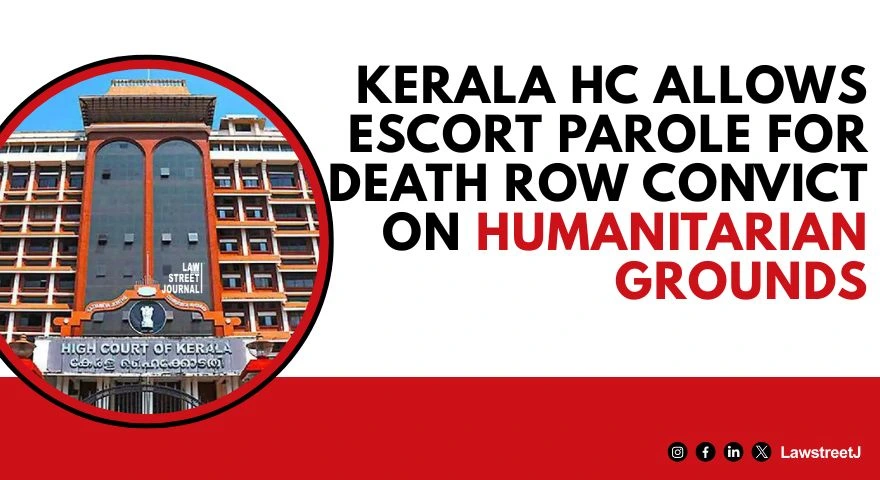Kerala: The Kerala High Court has delivered a significant judgment granting escort parole to a condemned prisoner sentenced to death, emphasizing that justice must be tempered with humanity, compassion, and empathy—even in the most serious cases.
The court of Justice P.V. Kunhikrishnan was hearing a petition filed by Jasmin Shaji seeking escort parole for her husband, a death row convict, to visit his bedridden 93-year-old mother. The court noted:
“The petitioner’s husband is a condemned prisoner, facing capital punishment based on the judgment of the Additional Sessions Court – I, Mavelikara in SC No. 461/2022.”
Addressing the legal framework, counsel for the petitioner argued:
“Section 42 of the Act, 2010 says that every prisoner sentenced to death shall be treated as a normal convicted person until his final executable sentence is passed, but such a prisoner is not entitled to any leave or escort visit.”
The counsel also highlighted the statutory prohibition, stating:
“Similarly, Rule 339(2) also says that convicts who are sentenced to death are not entitled to ordinary leave or escort visits.”
In a profound observation on the nature of justice, the court stated:
“Justice, without the soft hand touch of humanity, compassion, and empathy, is not justice. But humanity, compassion, and empathy are matters of judicial discretion, to be exercised based on the facts and circumstances of each case.”
Emphasizing India’s approach to justice, the court observed:
“India is not a country where retributive punishment like ‘an eye for an eye, a tooth for a tooth’ is adopted. Our country is known for its humanity, compassion, and empathy while delivering justice.”
On the constitutional duties of courts, the court remarked:
“It is the duty of a constitutional court to see that the fundamental needs and basic rights of a prisoner are protected until the sentence is finally executed.”
Reinforcing its constitutional jurisdiction, the court stated:
“To protect the basic rights of an individual—whether he is a convict or a condemned prisoner—this Court can invoke its extraordinary jurisdiction under Article 226 of the Constitution of India.”
While acknowledging the gravity of the crime, the court maintained its humanitarian stance:
“It is true that the petitioner’s husband may not deserve any humanitarian consideration because, according to the prosecution, he and the other accused brutally murdered the victim in front of his mother, wife, and child.”
However, the court distinguished between legal justice and human compassion:
“But a court of law cannot take an inhuman stand like the prisoner who orphaned the kith and kin of the victim.”
In its final directive, the court held:
“Here is a case where the condemned prisoner wants to see his sinking mother, who is aged 93. The medical evidence fully justifies that the mother of the convict is in a sinking stage. I think an escort parole can be allowed.”
The court granted escort parole with specific conditions—allowing the convict to spend a minimum of six hours with his mother under strict police surveillance, with arrangements to be made by the District Police Chief within three days of receiving a certified copy of the judgment.
The court reiterated that despite the statutory bar under Section 42 of the Kerala Prisons and Correctional Services (Management) Act, 2010 and Rule 339(2), constitutional courts retain extraordinary jurisdiction under Article 226 to protect basic human rights.
Advocates K.S. Madhusoodanan, M.M. Vinod Kumar, P.K. Rakesh Kumar, K.S. Mizver, M.J. Kirankumar, and Shaiq Rasal M. appeared for the petitioner, while the Public Prosecutor and Additional Director General of Prosecution appeared for the respondents.
Case Title: Jasmin Shaji v. State of Kerala & Others




![Kerala HC Quashes 498A Dowry Harassment Case Against Live-In Partner, Citing Lack of Relative Status [Read Order]](/secure/uploads/2023/08/lj_5693_1057c042-1e57-4e27-8c9e-25af0ec38ec4.jpg)
![Watching porn on mobile: Kerala HC highlights importance of mother cooked meals, outdoor sports [Read Order]](/secure/uploads/2023/09/lj_9155_Parental_supervision_of_mobile_phone_usage.jpg)
![Lakshadweep MP Mohammed Faizal Disqualified from Lok Sabha After Conviction Suspension Plea Rejected by Kerala High Court [Read Notice]](/secure/uploads/2023/10/lj_9640_87b5fd97-0e05-4ff8-9a99-3be1e4446192.jpg)






